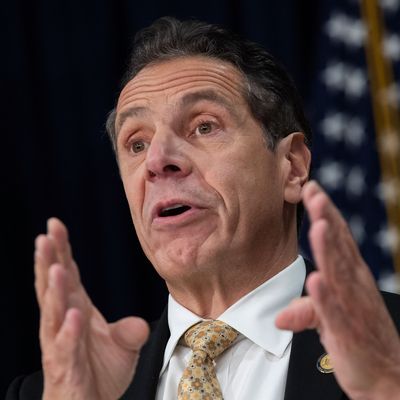
New York’s recently elected Democratic trifecta, the first since 2011, has finalized its first budget. With Democrats in control of each branch of government, the party enjoys enormous leeway both to pass precedent-setting legislation and to rearrange the state’s budget priorities. In some areas, they succeeded in doing so: The budget for this fiscal year ends cash bail for 80 percent of arrests, creates a congestion tax that will help fund improvements to the New York City subway, releases hundreds of millions of dollars in funding for the New York City Housing Authority, and raises funding for public education.
But as positive as these provisions are, lawmakers fell short of progressive expectations in other respects. Public campaign financing isn’t the only progressive policy lawmakers punted into an uncertain future, but it is a key priority for activists, and lawmakers couldn’t agree on a version of the policy in time to include it in this year’s budget. Research suggests that public financing, which would match small donations with taxpayer dollars, would help counter the influence of major donors and lobbyist groups. New York’s existing campaign-finance laws are “unusually lax,” reported the Brennan Center for Justice, which supports public financing. Small-donor participation in the state is low, which means that large donations wield significant influence in New York, even by the standards of other states. Public financing could, according to the Brennan Center and other progressive groups like the Center for Popular Democracy, increase the power of small donors and make lawmakers more accountable to their constituents.
Public financing also some has institutional support within the Democratic Party. Nationally, House Democrats introduced a bill that would have created a pilot program for publicly financed elections; voters could request a “My Voice” voucher that would allocate funds to candidates in increments of $5. Cuomo himself backed public financing’s inclusion the budget, and proposed a six-to-one funding match for small donations; had it survived this year’s budget negotiations, the proposal would have amplified the influence of small donors.
So why did New York’s trifecta balk at public campaign financing? For one, Democrats still have to contend with 66 Republican legislators. But there are other, less partisan explanations for this year’s budget. Partisan affiliation does not negate the influence of money in politics, and as a result, Democratic control of state government does not guarantee progress.
In March, Assembly Speaker Carl Heastie, a Democrat, told reporters that he didn’t have the votes to keep public financing in the budget; members were instead interested in an alternative that didn’t use public funds. “I think they want to have the discussion but I’d say right now there’s not 76 members who want to move forward with it in the next three weeks in the budget,” he said, according to the Gotham Gazette. Heastie was right, and for now, public financing is on hold. As Gothamist reported on Monday, lawmakers became a parody of themselves, agreeing only to create “a commission to study the issue.” The bipartisan commission does have a mandate to come up with some kind of public-financing scheme, but success isn’t guaranteed, especially if the state Democratic Party can’t agree on a solution. The reason the Democrats were so reluctant to adopt public financing may have something to do with the makeup of this year’s freshman class of legislators. As Politico noted in March, a number of new Democratic legislators earned their seats by defeating incumbents. If an insurgent candidate gathered enough grassroots support, public financing could boost their campaign even further. Advocates for public financing say that’s the point: Public financing democratizes elections and lowers financial barriers that can keep working-class candidates without connections to major donors out of the electoral process.
On his Twitter account, State senator Brad Hoylman also linked public financing to the demise of the pied-à-terre tax, which became a casualty of the state’s powerful real-estate lobby.
Cuomo, like Hoylman, had supported the tax. But the Real Estate Board of New York called it “a bad tax that has no analysis behind it,” the Wall Street Journal reported; the lobby also insisted that the tax’s passage would deter wealthy homeowners from seeking second homes in New York City. REBNY’s opposition seemingly sounded a death knell for the tax. Though it’s impossible to know if millionaires and billionaires really would have dodged the city en masse because of the tax, the threat may have cost the state necessary revenue. According to some projections, the proposed tax would have raised around $665 million per year. The mansion tax, by contrast, will raise around $365 million, Curbed reports.
Voters created an opening for a new, more progressive era in New York politics, but it’s not clear from this year’s budget that lawmakers are ready to bring that era to life.






























